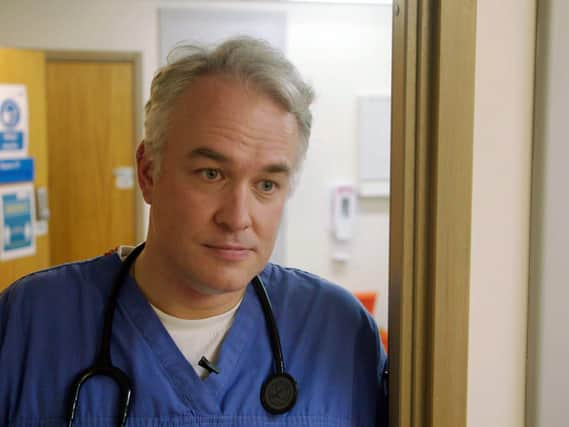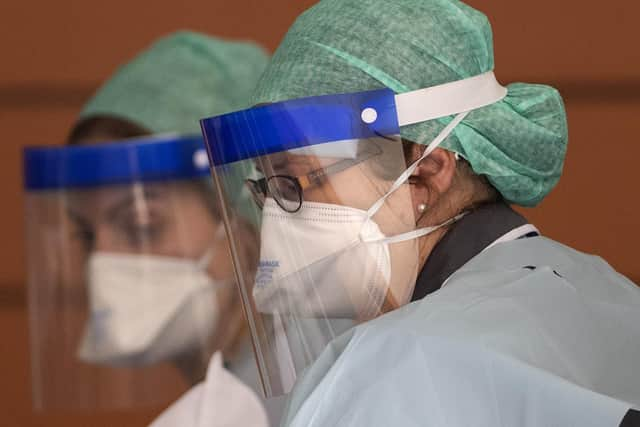Most patients at Yorkshire's first Long Covid clinic are 'slowly getting better'


People who contract Covid-19 can suffer from a range of issues, including fatigue, problems with memory and concentration, chest pain, shortness of breath, dizziness, and joint pain.
At the specialist clinic in St Luke’s Hospital in Bradford, Dr Paul Whitaker and his team help people who have endured with these symptoms for longer than 12 weeks, as they are the ones who are diagnosed with post-Covid syndrome, which is also known as Long Covid
Advertisement
Hide AdAdvertisement
Hide AdHundreds of people have been treated at the clinic since it was set up in May 2020 and it now receives around 20 referrals a week.


But the NHS states around one in 10 people endure long-term symptoms of the virus and Dr Whitaker is concerned there may be thousands of people in Bradford who are suffering in silence, as more than 49,700 people in the city have tested positive for the virus during the pandemic.
He said: “It's incredible how every patient in clinic, almost word for word, says the same thing so often: it’s an extreme fatigue.
“They often complain of muscle aches and pains, especially in the legs, chest tightness or chest pain almost and palpitations.
Advertisement
Hide AdAdvertisement
Hide Ad“They'll also report, poor concentration and difficulty doing complex tasks, but the biggest problem by far is this overwhelming fatigue, so as soon as they do anything they just become really, really exhausted.
“We've got 20 or so people who are at a year and not showing signs of improvement but most people are slowly, slowly getting better.”
He added: “We've had some people who even now we're literally kind of walking a few steps and these are often quite fit people to begin.”
While medications are prescribed to deal with certain symptoms of Long Covid, none of the patients are treated with medication alone after they are referred to the specialist clinic.
Advertisement
Hide AdAdvertisement
Hide AdPersonalised care plans are drawn up to determine for each patient, so they can be provided with physiotherapy, occupational therapy or psychotherapy.
Dr Whitaker said research suggests that people who became seriously ill and required hospital treatment shortly after they were infected with the virus are more likely to suffer with Long Covid, but some patients at the clinic initially experienced relatively mild symptoms.
Earlier this year, the National Institute for Health Research and UK Research and Innovation announced that £18.5 million had been provided to fund four research studies into the cause, symptoms and treatment.
But the NHS staff who have been working at the NHS Long Covid clinics during the pandemic have several theories about the underlying cause of the condition.
Advertisement
Hide AdAdvertisement
Hide AdDr Whitaker said: “Covid comes and it triggers a very strong inflammatory response and in some people this inflammatory response appropriately dies down and settles once Covid is gone.
“Whereas in other people, the immune system is kind of permanently switched on and so I think what we have is the body's inflammatory response to the virus.
“But there's also other suggestions too. For example, in some people the virus itself might not clear as quickly as in other people, so there have been some people who've had biopsies done several months after having Covid and they have still got evidence of virus in their body.
“In some people, they may well be this very low level active viral infection still persisting. We've certainly had a case in Bradford of somebody who had persistent Covid for eight months, constantly swabbing positive.
Advertisement
Hide AdAdvertisement
Hide Ad“But nobody really understands it. It’s going to be this complex interaction between the virus and active infection, versus inappropriate immune system responses.”
The specialist Long Covid clinic at St Luke’s hospital was one of the first to open in England, as it was set up before any dedicated NHS funding came through, but there are now more than 60 across the country.
Dr Whitaker said there is “a great variation of care across regions” and “some patients are really getting left behind” but he is confident the treatment will continue to improve.
“I don't think it'll ever be medication but I think when people work out the right rehabilitation strategies, hopefully that good practice will be passed down throughout the NHS,” he said.